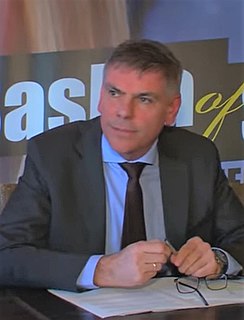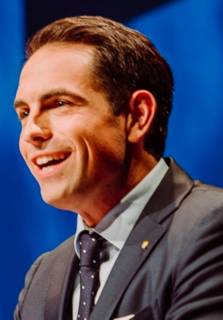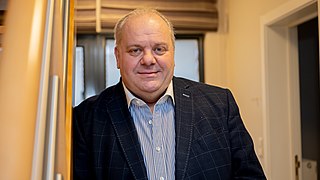Vlaams Belang
This section may contain material unrelated or insufficiently related to the topic of the article .(December 2022) |
At the present time an attempt to use the law would most likely be made against the far-right Flemish party Vlaams Belang. A Belgian court ruled in 2004 that the party's predecessor Vlaams Blok had encouraged discrimination against foreigners. [8] According to the party's supporters, both the 2004 conviction and the current bill are political actions by their opponents.
After the Supreme Court ruling, the leadership of the VB seized the occasion to dissolve itself, and start afresh under a new name. On 14 November, the Vlaams Blok thus disbanded itself, and the Vlaams Belang was established. The Vlaams Belang instituted a number of changes in its political program, carefully moderating some of the more radical positions of the former Vlaams Blok. Nevertheless, the party leader Frank Vanhecke made it clear that the party would fundamentally remain the same; "We change our name, but not our tricks. We change our name, but not our programme."
Former Vlaams Blok chairman Frank Vanhecke was chosen as chairman of the Vlaams Belang on 12 December 2004. Like its predecessor, the Vlaams Belang has continued to be subjected to the cordon sanitaire, wherein all the traditional Flemish parties has agreed to systematically exclude the party, and never form a coalition with it. This situation was however altered slightly with the emergence of the smaller right-wing party List Dedecker (founded in 2007), which has not joined in on the agreement. In an interview with the popular weekly Humo, Flemish Prime Minister Yves Leterme for instance declared that a local chapter of his Christian Democratic and Flemish party (CD&V) that would form a coalition or close agreements with the Vlaams Belang, would no longer be considered part of the CD&V.
The VB contested the 2006 municipal elections on the theme of "Secure, Flemish, Liveable". The VB enjoyed a massive increase of votes, and its council members almost doubled, from 439 to about 800. The election result was described by the party as a "landslide victory." In Antwerp, the VB's vote count ran behind that of the Socialist Party, which increased their share of the vote dramatically. Nevertheless, the VB, which was in a coalition with the minor VLOTT party, slightly increased their vote in the city to 33.5%. In the 2007 general election, the party won 17 seats in the Chamber of Representatives and five seats in the Senate, remaining more or less at status quo. Earlier the same year, the party joined the short-lived European Parliament group Identity, Tradition and Sovereignty alongside parties such as the French National Front.
In 2008, Bruno Valkeniers was chosen as new party chairman for the VB, having contested the position unopposed. In 2009, the party contested elections for the Flemish Parliament and the European Parliament. The party was reduced from 32 to 21 seats (from the Vlaams Blok's record 24%, to 15%) in the Flemish parliament, and from three to two seats in the European parliament. In the 2010 general election, the party was again reduced, to 12 seats in the Chamber, and three in the Senate. This was largely due to the great success of the more moderate new party New Flemish Alliance, which also campaigned on Flemish independence. After the party suffered heavy losses during the local elections of 2012 Bruno Valkeniers stepped down as party chairman and was succeeded by Gerolf Annemans.
In the 2014 federal and regional elections the party again suffered a big loss and was reduced to 5.9% of the Flemish vote. The European list, pulled by Annemans, scored slightly better with 6.8%. Annemans resigned as party leader, a function he only performed for two years, and argued for a rejuvenation of the party. The following party chairman election was won by the only candidate, the then 28 years old Tom Van Grieken.












